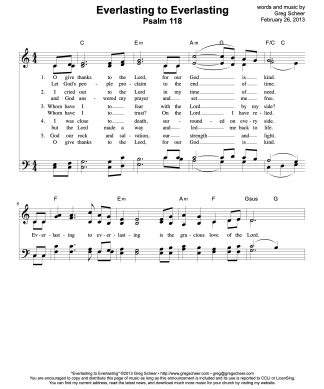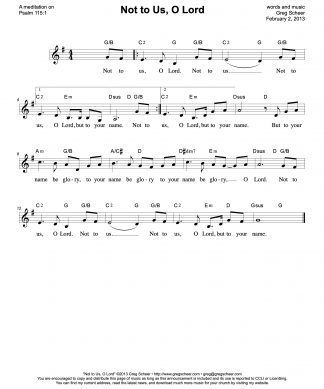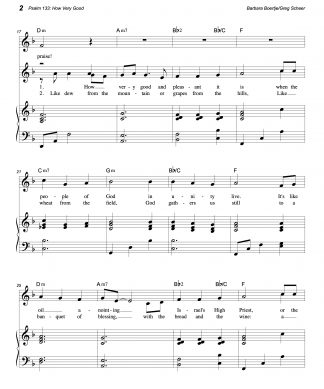Mount Zion has a special significance to the author of Psalm 48 because it is the location of the holy city Jerusalem, the palaces of Israel’s king, and the temple of Yahweh. Just as God dwelled in Zion for the Israelites, the Church of Christ should be “a city on a hill”–a holy place that is set apart for God that allows the light of the Spirit to shine. Or as Jesus says in Matthew 5:14, “You are the light of the world. A city on a hill cannot be hidden.”
Psalm Songs
Showing 73–84 of 108 results
-
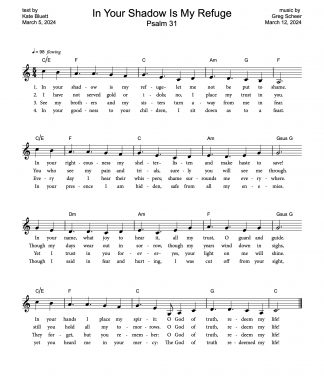
Psalm 31: In Your Shadow Is My Refuge
$0.00 – $5.00 Select options This product has multiple variants. The options may be chosen on the product pagehttps://musicblog.gregscheer.com/wp-content/uploads/Psalm-31_-In-Your-Shadow.mp3
Psalm 31 has a place in Holy Week worship because Jesus quoted it from the cross: “Into your hands I commit my spirit.” Though verses 9-13 give a glimpse into the terror of the cross, much of the Psalm focuses on trust in God’s deliverance. Kate Bluett has written a lovely setting of 31 which captures not only the heart of the Psalm, but also the structure, from plea for help to description of affliction to final words of hope. It is a great comfort to me to know that I can meditate and hope in the same scriptures that Jesus recited in his time of deepest distress.
-
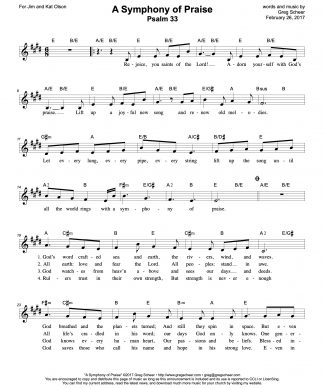
Psalm 33: A Symphony of Praise
$0.00 Add to cart[embed]http://musicblog.gregscheer.com/psalm_033-a_symphony_of_praise.mp3[/embed]Psalm 33 is a songwriter’s dream: it commands us to sing a new song, mentions a variety of instruments, and admonishes us to play skillfully. This bright, joyous song helps us do just that while also allowing us to follow the Psalmist into themes of creation, judgment, power, and trust.
This leadsheet is a free download. If you sing this song in your church please report its use to CCLI or OneLicense.
-
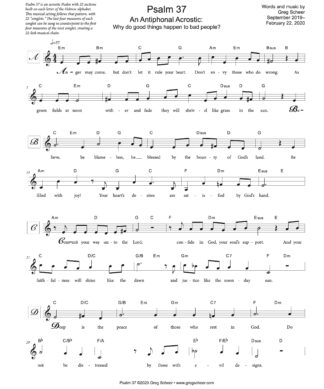
Psalm 37: An Antiphonal Acrostic
$0.00 Add to cart[audio mp3="https://gregscheer.com/wp-content/uploads/2020/05/psalm_37_demo-complete.mp3"][/audio]Psalm 37 is an acrostic Psalm with 22 sections built on each letter of the Hebrew alphabet. This musical setting follows that pattern, with 22 connected “songlets.” The last four measures of each songlet can be sung in counterpoint to the first four measures of the next songlet, creating a 22-link musical chain. It sounds complicated and esoteric; just take a listen to the MP3 demo and everything will make sense!
This leadsheet is a free download. If you sing this song in your church please report its use to CCLI or OneLicense. Download includes side-by-side Scripture and lyrics.
-
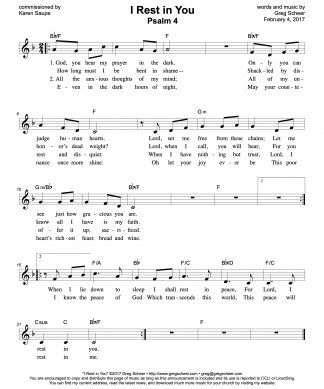
Psalm 4: I Rest in You
$0.00 – $5.00 Select options This product has multiple variants. The options may be chosen on the product page[embed]http://musicblog.gregscheer.com/psalm_004-i_rest_in_you.mp3[/embed]Psalm 4 is the lament of someone whose honor has been impugned. You can hear the theme of shame and honor recurring throughout. Ultimately, though, the Psalmist chooses to rest in the Lord. It reminds me of what Richard Foster says in The Celebration of Discipline—I believe in the section on silence—about not speaking in defense of yourself, but simply allowing your reputation to stand on its own. This lack of control is frightening, especially when your name is at stake, but ultimately we can’t control what others think of us. In this song, the lyrics and music turn the Psalm from an indignant defense (“Break their teeth, O Lord”) into a quiet prayer in the night.
-
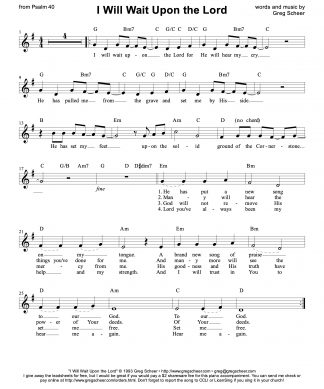
Psalm 40: I Will Wait Upon the Lord
$0.00 – $5.00 Select options This product has multiple variants. The options may be chosen on the product page[embed]https://musicblog.gregscheer.com/Ps040-i_will_wait.mp3[/embed]This was written for Cornerstone University Ministry at the request of Henry Knapp. I chose Psalm 40 because I felt that the image of the feet being placed on solid rock could be appropriately updated to refer to the Solid Rock, Jesus Christ, the Cornerstone of our faith.
-
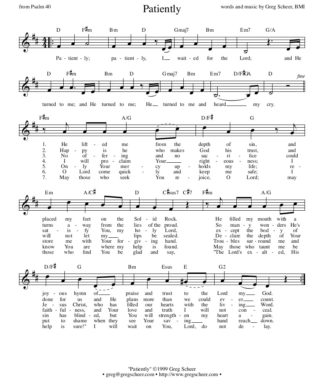
Psalm 40: Patiently
$0.00 – $25.00 Select options This product has multiple variants. The options may be chosen on the product page[embed]http://musicblog.gregscheer.com/wp-content/uploads/patiently_COS.mp3[/embed]This meditative rendering of Psalm 40 won the 2017 Church of the Servant New Psalm Contest. You can read the whole story below.
-

Psalm 41: Blessed Are the Weak
$0.00 Add to carthttps://musicblog.gregscheer.com/wp-content/uploads/psalm_041-blessed_are_the_weak.mp3
Psalm 41 is a prayer for healing–a prayer of hope though both enemies and friends are waiting for you to die. “Blessed are those who have regard for the weak; the Lord delivers them in times of trouble.” This is very similar to Jesus’ words in the Beatitudes: “Blessed are the poor in spirit, for theirs is the kingdom of heaven.” God has always sided with the poor, the weak, and the outsiders. We should, too, knowing that God will side with us in our moment of weakness.
This hymn is a free download. If you sing this song in your church please report its use to CCLI or OneLicense.
-
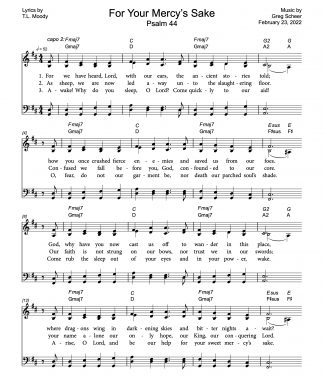
Psalm 44: For Your Mercy’s Sake
$0.00 Add to carthttps://musicblog.gregscheer.com/wp-content/uploads/psalm_44-for_your_mercys_sake.mp3
Lyricist T.L. (Tammy) Moody has a knack for finding fresh ways to express herself, or in this case express Psalm 44’s anguished cry for help of the original Psalm: “Awake, O Lord!” The Psalm is full of unresolved questions; similarly, the song’s harmonies remain unsettled throughout.
This hymn is a free download. If you sing this song in your church please report its use to CCLI or OneLicense.
-
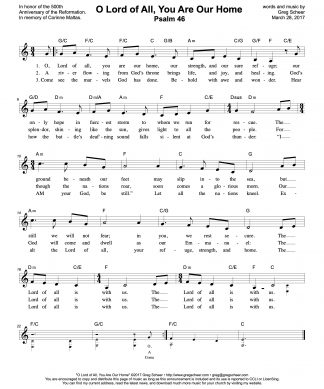
Psalm 46: O Lord of All, You Are Our Home
$0.00 – $5.00 Select options This product has multiple variants. The options may be chosen on the product page[embed]http://musicblog.gregscheer.com/psalm_046-o_lord_of_all.mp3[/embed]Psalm 46 offers comfort and hope in times of trouble. It doesn’t promise that we won’t experience hardship, but that God will be with us in those times.
In Martin Luther’s famous setting of Psalm 46, “A Mighty Fortress,” he focused on themes of strength and battle. In my setting, I highlight the Psalm’s images of God as a refuge–God’s stable presence among us in a chaotic world–concluding each verse with an affirmation of hope: “The Lord of all is with us.”
-
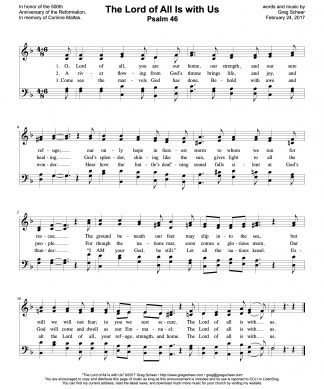
Psalm 46: The Lord of All Is with Us
$0.00 – $5.00 Select options This product has multiple variants. The options may be chosen on the product page[embed]http://musicblog.gregscheer.com/psalm_046-the_lord_of_all.mp3[/embed]This song is something of an homage to the Reformation. It is based on the same Psalm as Luther’s great “A Mighty Fortress” and can, in fact, be sung to that hymn’s tune. My tune uses a mixed meter like many Lutheran and Reformed tunes. The 2+2+3+3 pulse makes the hymn more challenging than most. If you’re up for the challenge, use a hand drum to keep the beat steady. If you’re not up to the challenge, try my song “O Lord of All, You Are Our Home,” which uses the same text set to a simpler tune.
-
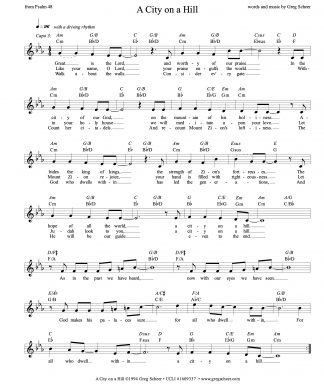
Psalm 48: A City on a Hill
$0.00 – $5.00 Select options This product has multiple variants. The options may be chosen on the product page[embed]https://musicblog.gregscheer.com/a_city_on_a_hill.mp3[/embed] -
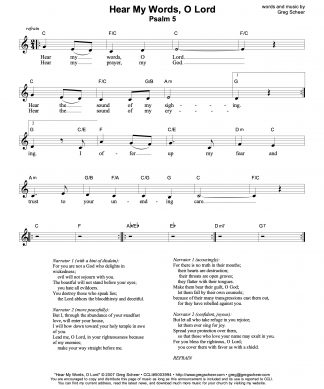
Psalm 5: Hear My Words, O Lord
$0.00 – $5.00 Select options This product has multiple variants. The options may be chosen on the product page[embed]http://musicblog.gregscheer.com/Ps005-hear_my_words.mp3[/embed]My setting of Psalm 5, “Hear My Words, O God” is composed for two narrators and congregational refrain. It appears as Psalm 5C in the Psalms for All Seasons hymnal, but if you want the un-squished piano music and choral parts you hear on this recording you’ll only find it here. The above recording is just a rough read-through by the Choral Scholars which doesn’t include the scripture reading. The narration allows the whole Psalm to be heard and allows the multiple voices of the original text to come through, as you can hear from the live worship recording below.
[embed]http://musicblog.gregscheer.com/psalm_5_hear_my_words.mp3[/embed]
Showing 73–84 of 108 results

